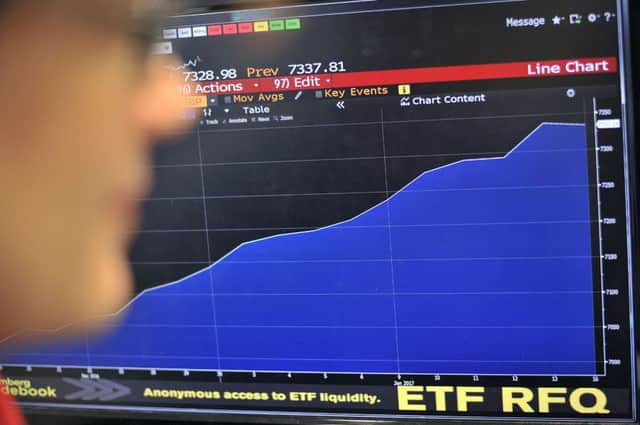Bill Jamieson: Short and long-term winners in investment field


He recently revealed some of his secrets to Jonathan Jones of FE Trustnet. But the wisdom of his approach has been overcast by the stellar performance of the stock market over most recent periods.
The FTSE100 Index has risen by more than 16 per cent over the past year, while the typical UK smaller companies fund has climbed by 37.9 per cent.
Advertisement
Hide AdAdvertisement
Hide AdEven over the past six months – a period dominated by concerns over Brexit, Article 50 battles, rising inflation, the UK general election and its deeply uncertain outcome – equity markets have turned in an impressive performance.
Nor has this been confined to the UK. Despite geo-political worries, the Trump presidency and political dramas across continental Europe, overseas markets have been faring well.
Investment trust sector watcher Winterflood Securities reports that in the April-June period, the sector delivered a fifth consecutive quarter of positive performance. So far in 2017 it is up by 10.6 per cent compared with an increase of 5.5 per cent for the FTSE All Share.
Best-performing sector in the first half of 2017 was European Smaller Companies where the average trust returned 32 per cent. Three other smaller companies-focused regional sectors were also among the top ten performing sectors, including Japan, UK and Global.
However, for most retail investors, it is longer-term performance – and solid and reliable dividend payers in particular – that really matter.
Earlier this year the Association of Investment Companies (AIC) revealed the industry’s “Dividend Heroes” – three trusts that had notched up 50 years of consecutive increases. These were City of London IT, Bankers IT and the Dundee-based giant Alliance Trust.
But last week the half century club gained another member as Caledonia unveiled annual results, making it the fourth investment company to have increased its dividends every year for 50 years.
With interest rates at an all-time low, investors remain hungry for income and the ability of investment companies to boost dividends from reserves at appropriate moments is an added attraction.
Advertisement
Hide AdAdvertisement
Hide AdScottish Mortgage Trust, the star of the Edinburgh-based Baillie Gifford stable, is not a dividend-focused investment company, but it has enjoyed stunning success – all the more notable given the questioning of active fund management in recent years and the growth of passive funds.
Over one, three, five and ten-year periods, the £5.7 billion trust is either first or second in the IT Global sector and has beaten the FTSE All World benchmark over all periods. So how has Anderson done it? He stressed to FE Trustnet the importance of maintaining a long-term view in volatile conditions, seeking out asymmetric returns and greater company interaction. “Fund management is frankly a very broken industry,” he said. “I think much of the debate about the problems is I’m afraid attributable to us and our refusal to invest properly and allocate capital properly.”
He identified the three features that characterise SMT’s approach: first, being genuinely long-term focused.
Says Anderson, “Lots of fund managers will say they are long term but they are not if you look at the turnover of their portfolios.” One example he cites is Amazon, a company that the trust has held for more than ten years.
The second feature is related to the ability to look through short-term variations and concentrate on the ability of companies and their durable earning power. Humans on average dislike loss 2.5 times as much as they enjoy gains. That’s not true of fund managers, says Anderson. “At the very least [they] dislike losses ten times as much as they like gains.”
This unwillingness to stomach short-term losses can lead to managers missing some outstanding opportunities. Fund managers who sell out of top performers due to short-term factors are denying themselves long-term returns.
And the third feature he singled out for out-performance was having better information than the market: a characteristic of SMT’s approach is intense research on company data and regular contact with the companies where the trust has significant investment. This is what a team of experienced analysts can provide for the benefit of private investors. In this, Scottish Mortgage is an exemplar.